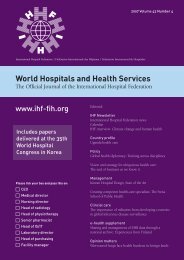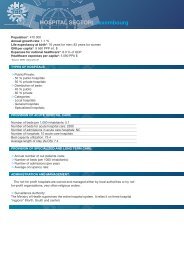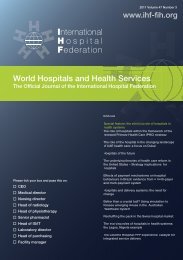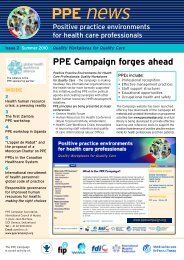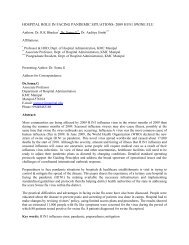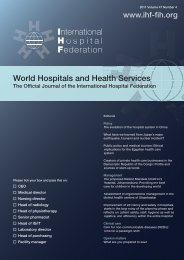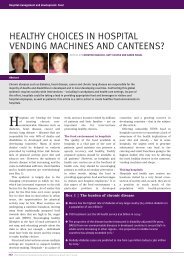World Hospitals and Health Services - International Hospital ...
World Hospitals and Health Services - International Hospital ...
World Hospitals and Health Services - International Hospital ...
You also want an ePaper? Increase the reach of your titles
YUMPU automatically turns print PDFs into web optimized ePapers that Google loves.
MANAGEMENT: NURSING SHORTAGES<br />
The impact on Asian<br />
health care systems of<br />
nursing migration<br />
KHURSHID KHOWAJA, RN, RM, BSCN, PHD<br />
ASSISTANT PROFESSOR AND DIRECTOR NURSING SERVICES, AGA KHAN UNIVERSITY HOSPITAL, PAKISTAN<br />
Abstract<br />
Nurses are precious resource in every corner of the world <strong>and</strong> hospitals are facing serious challenges in providing<br />
high quality care with current nursing shortages. While the shortage of nurses is a worldwide issue, impacting<br />
currently more on under developed countries, little literature is available on this aspect of the issue. Lots of job<br />
opportunities are available for nurses in western countries, advertised on a daily basis, that attract nurses <strong>and</strong><br />
result in major nursing migration from Asian countries to the western world.<br />
The nursing management group at the Aga Khan<br />
University <strong>Hospital</strong> (AKUH) is highly stressed because<br />
of the high turnover rate of nurses in this hospital. The<br />
average annual turnover rate is calculated at 23% (see Figure<br />
1), resulting in 60% of nurses having less than two years<br />
experience.<br />
Turnover rate <strong>and</strong> years of experience<br />
The turnover rate is high in the first three years where 71% of<br />
nurses resign with less than three years experience. Thirty-two<br />
percent of nurses resign before completion of one year’s<br />
service with AKUH as indicated in Figure 2. The major issue<br />
associated with these resignations is that 50% of nurses resign<br />
with a notice period of only 24 hours, where nursing<br />
management require three to six months to replace their<br />
positions <strong>and</strong> this time lapse impacts on the quality of care.<br />
Reasons for turnover<br />
The major reason for the high nursing turnover rate is the<br />
migration of 66% of nurses to countries such as the United<br />
States, the United Kingdom <strong>and</strong> Canada as indicated in Figure<br />
3, where the working wages offered are quite high compared<br />
to Pakistan. Out of these 66%, 70% migrate to the United<br />
Kingdom, where nurses are not required to pass any type of<br />
exam at entry level.<br />
Relationship of nursing turnover to patient safety<br />
The Institute of Medicine (2004) stated that nurses are<br />
considered the largest component of the health care workforce<br />
<strong>and</strong> their high turnover can have adverse consequences for<br />
patient safety. The Institute of Medicine further stated that<br />
leaner nurse staffing is associated with increased length of stay,<br />
nosocomial infection (urinary tract infection, post operative<br />
infection, <strong>and</strong> pneumonia), <strong>and</strong> pressure ulcers. These studies<br />
taken together, provide substantial evidence that increased<br />
nurse staffing is associated with better patient outcomes.<br />
Subsequent studies have added to this evidence base <strong>and</strong><br />
substantiate the observation that greater numbers of patient<br />
deaths are associated with fewer nurses to provide care (Aiken<br />
et al., 2002) <strong>and</strong> less nursing time provided to patients is<br />
30%<br />
25%<br />
20%<br />
15%<br />
17%<br />
27%<br />
21% 23%<br />
10%<br />
5%<br />
0%<br />
2000 2001 2002 2003<br />
Figure 1: Turnover rate for nursing staff 2000-2003<br />
Vol. 40 No. 4 | <strong>World</strong> <strong><strong>Hospital</strong>s</strong> <strong>and</strong> <strong>Health</strong> <strong>Services</strong> | 19



